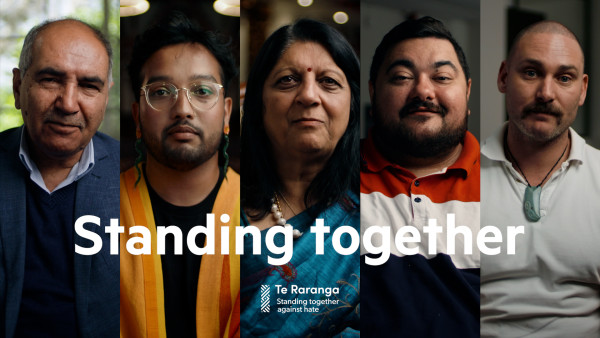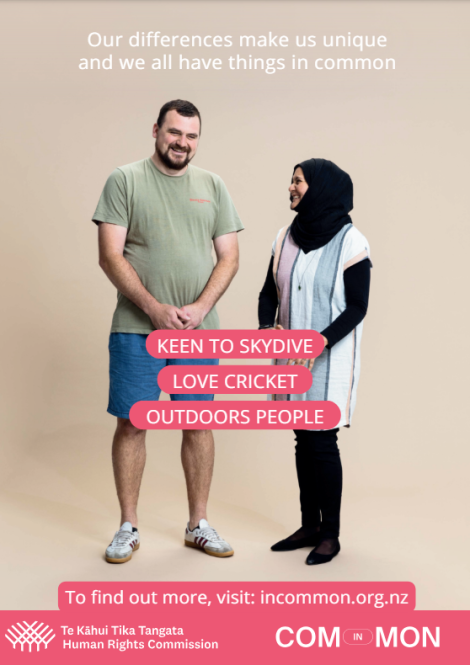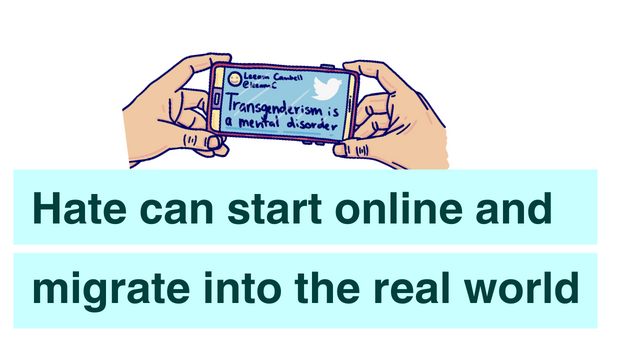What are hate-motivated crimes?
New Zealand Police(external link) identifies a hate-motivated crime as occurring when two things have happened:
- a crime has been committed (for example an assault, damage to property or threatening behaviour)
- the person(s) committed the crime because of hate (bias or prejudice) towards the victim’s race, religion, gender, sexuality, disability, age, or any other part of their identity.

Any crime can have a negative impact but when the action is motivated by hate the impact and harm can increase. When someone is targeted because of their faith, because of a disability, or because of their race, ethnicity or nationality their quality of life, happiness, and feelings of safety can suffer.
Standing against hate
The Te Raranga Advisory Group have developed a range of resources that can be used for training and educating in workplaces, community spaces, or schools to help people:
- recognise hate-motivated behaviour
- know what to do if it is happening now
- know what to do if you, or anyone you know, has been impacted
- understand the different reporting and support channels and where to access more information.

A series of videos have also been created that tell the stories of five people based in Aotearoa New Zealand and their diverse experiences. These videos can be used to support conversations at home, in the workplace, in school or at public gatherings.
- Te Raranga - Standing Together Against Hate resources(external link)
- Standing Against Hate - Education and training pack (external link)
- Standing together against hate in Aotearoa leaflet(external link)
Social cohesion

In the aftermath of the terror attacks on Al Noor Mosque and Linwood Islamic Centre, which killed 51 people, communities in Ōtautahi Christchurch have come together and formed 'InCommon'.
InCommon focus on helping people find the things they have in common and helping people to connect and and live a life of dignity and mana.
Te Kāhui Tika Tangata Human Rights Commission and InCommon have created the 'We All Belong Here' campaign to help increase social cohesion and reduce hateful divides.
Reporting hate-motivated crimes
If someone is in danger or an incident is happening now, call 111 immediately.
There are many places you can report to, including where you can speak-up safely and anonymously.
NZ Police
- Everyone has the right to report, including if you are a witness, family member or colleague. Someone can report on your behalf or support you to report.
- If an incident has already happened and no one is in immediate danger, call 105, or report it online at police.govt.nz(external link). Make sure that you and any other affected people are in a safe place, away from the offender.
- If anyone thinks the incident was motivated by hate towards a person or group’s identity (such as their race, religion, sexual orientation, gender identity, disability or age).
Crime Stoppers
- You can report anonymously to Crime Stoppers by submitting a report on their website(external link) or by calling 0800 555 111.
Te Kāhui Tika Tangata Human Rights Commission
- The Human Rights Commission offers a free, confidential service to help with enquiries and complaints about unlawful discrimination, sexual and racial harassment, and harmful speech. Visit their website(external link) or call 0800 496 877 for more information.
Netsafe
- You can report issues including online abuse, bullying and harassment to Netsafe on their website(external link).
The Department of Internal Affairs: Countering Violent Extremism Online
- Te Tari Taiwhenua Department of Internal Affairs Digital Violent Extremism Team(external link) investigates complaints and prosecutes people who collect and distribute terrorist and violent extremist content online and ensures illegal content is not available to the public. You can report objectionable material on their website(external link).
